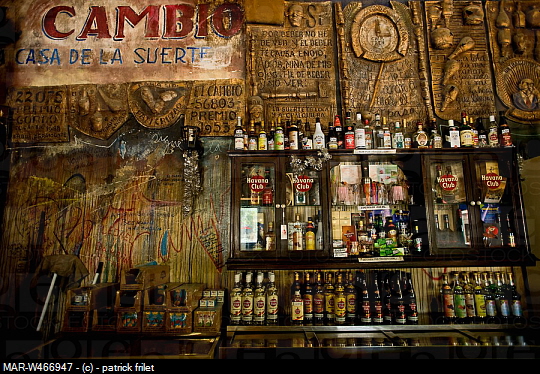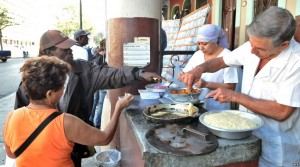What is the change that people want in Cuba?
Of 120 respondents, men and women, whites, blacks and mulattos, and aged between 19 and 87 years, 90% believe that the exile will be a cornerstone for the future of the island.
Nidia, 74, does not believe that is the best time to talk politics. Open her Chinese refrigerator and says: “After this package cook soya mince I have to go out to “zancajear” for the lunch of tomorrow”.
But a glimpse of the future is a recurring theme among Cubans. “I’ve always been poor. Before 1959 the food was not a headache, but the money was scarce. Education and health were efficient, both public and private. In certain regions of the country there was a terrible misery. With Batista, if you did not get involved criticizing politics, nor has you knew we lived in a dictatorship. The big problem is that Castro’s collective ideology planted on high expectations: democracy, sovereignty and prosperity. In 54 years of revolution none of that works. And if you get into politics you can go to jail, in the country a military caste and senior party members have privileges. And we are not as free and sovereign: for one reason or another, depend on the grant of another country. Yesterday was the USSR today is Venezuela “says Nidia.
While peeling a green banana, adds: “If now is make a plebiscite to decide which way to go, I’d vote for capitalism. Not perfect, but there freedoms. Of socialism should remain education and public health, coexisting with private “.
In the past two months, dozens of people in lines, streets, private taxis or at home, I have wondered what would live system. The 80% wants major changes, regardless of the course. As long as it’s not wild African-style capitalism.
“If the future is a capitalist society in the style of some nations in Africa, with China taking over natural resources as any empire heartless, I swear that I stand in the Sierra Maestra,” said Orlando, a taxi driver.
“It would be desirable to go for a democracy similar to the Nordic countries and Switzerland. I think the model is closer Costa Rica. Cuba has 95% of the population with high level of education. The quality is not the best, but we are not illiterate. And there are a large percentage of Cubans in the United States with expertise, in addition to capital, “says the driver habanero.

PABLO MILANES….”Yo Quiero un Cambio…”
Of 120 respondents, men and women, whites, blacks and mulattos, and aged between 19 and 87 years, 90% believe that the exile will be a cornerstone for the future of the island.
“The exiles have created a powerful political lobby in the United States. Entrepreneurs also aim. It is true that they have the support of the U.S. government since 1966 Adjustment Act gives facilities for residency. But no one can deny the success of many Cubans in Florida. Visualize our future to the best of their experiences in the democratic and knowledge in business administration. Initially there will be two lanes for them to have money and to have formed in a free country, but soon there will be a balance, if Cubans on the island have the wisdom to choose politicians capable, modern and transparent, not corrupt . The question I have is where are these politicians. Those who are ruling are hopeless. And today’s dissidents would not vote for either for president, “says Carlos, a sociologist.
All respondents call for more freedom. Expression, political and cultural. “See the TV channels you want. Read books that interest me. Say out loud what I think without this constituting a crime, “said Rosario, clerk.
Several black Cubans believe that in the future, could promote racism. “There are already signs. Blacks continue to have less access and opportunities. We have less money, just participate in politics and rarely we succeed, “says Luis, translator. He proposes: “Addressing racial differences openly. Losing the fear of black. Designing a multiracial society with equal rights for everyone not to remain a dead letter. ”
Of the 80% that want change, almost 50% prefer capitalism, not dazzle them extreme liberalism. “The state must maintain efficient social security network. And a quality education and health. There are things that are redeemable Cuban socialism, “said Maria Rosa, an engineer.
Although minority within respondents are not lacking those who think that the country will improve with the timid reforms that Raul Castro has applied. “I have 65 years, I lived the capitalist stage. Do not recommend it to anyone. It is true, we must make changes, economic and political. The opposition should be a legal option. I think we’re on the right track. All government critics, but nobody asks what if Raul reforms work? “Argues Michael, state administrator.
In the respondents is clear-even among those who support the regime-that changes must be deeper. And they are aware that the views of citizens often matter little to the rulers.
Sources: CubaStreetSurvey(june2013)/RM/García Quintero/thecubanhistory.com
Cuba, street survey (June 17, 2013)/Encuesta en las calles de cuba (17/06/13)
The Cuban History, Arnoldo Varona, Editor
CUBA, UNA ENCUESTA DE LA CALLE (17 de Junio 2013)
¿Cuál es el cambio que la gente quiere en Cuba?
De 120 encuestados, mujeres y hombres, blancos, negros y mulatos, y en edades comprendidas entre 19 y 87 años, el 90% considera que el exilio será una piedra angular en el futuro de la isla.
Nidia, 74 años, no cree que sea el mejor momento para hablar de política. Abre su refrigerador chino y dice: “Después que cocine este paquete de picadillo de soya tengo que salir a la calle a zancajear la comida de mañana”.
Pero vislumbrar el futuro es un tema recurrente entre los cubanos. “Siempre he sido pobre. Antes de 1959 la comida no era un dolor de cabeza, sí el dinero, que escaseaba. La educación y la sanidad eran eficientes, tanto la pública como la privada. En determinadas regiones del campo existía una miseria atroz. Con Batista, si no te mezclabas en política, ni cuenta te dabas que vivíamos en una dictadura. El gran problema del castrismo es que en el ideario colectivo plantó expectativas muy altas: democracia, soberanía y prosperidad. En 54 años de revolución nada de eso funciona. Y si te metes en política puedes ir preso, hay en el país una casta militar y los altos miembros del partido gozan de privilegios. Y no somos tan libres ni soberanos: por una razón u otra, dependemos del subsidio de otro país. Ayer fue la URSS hoy es Venezuela”, comenta Nidia.
Mientras pela unos plátanos verdes, añade: “Si ahora mismo se hiciera un plebiscito para decidir qué rumbo tomar, yo votaría por el capitalismo. No es perfecto, pero existen libertades. Del socialismo debiera mantenerse la educación y la salud pública, cohabitando con la privada”.
En los últimos dos meses, a decenas de personas en colas, calles, taxis particulares o en sus casas, les he preguntado en cuál sistema quisieran vivir. El 80% quiere cambios profundos, sin importarles el rumbo. Siempre y cuando no sea un capitalismo salvaje estilo africano.
“Si el futuro es una sociedad capitalista al estilo de algunas naciones en África, con China apropiándose de los recursos naturales como cualquier imperio desalmado, te juro que me alzo en la Sierra Maestra”, señala Orlando, taxista.
“Lo deseable sería apostar por una democracia similar a la de los países nórdicos o Suiza. Creo que el modelo de Costa Rica está más cercano. Cuba tiene un 95% de la población con alto nivel de enseñanza. La calidad no es la mejor, pero no tenemos analfabetos. Y hay un porcentaje amplio de cubanos en Estados Unidos con experiencia y conocimientos, además de capital”, acota el taxista habanero.

PABLO MILANES….”Yo Quiero un Cambio…”
De 120 encuestados, mujeres y hombres, blancos, negros y mulatos, y en edades comprendidas entre 19 y 87 años, el 90% considera que el exilio será una piedra angular en el futuro de la isla.
“Los exiliados han creado un poderoso lobby político en Estados Unidos. También empresarios de puntería. Es cierto que cuentan con el apoyo del gobierno estadounidense, que desde 1966 con la Ley de Ajuste les da facilidades para obtener la residencia. Pero nadie puede negar el éxito de numerosos cubanos en la Florida. Visualizo nuestro futuro con lo mejor de sus experiencias en el juego democrático y conocimientos en administración de empresas. En un principio habrá dos carriles, por ellos tener dinero y haberse formado en un país libre, pero en poco tiempo habrá un equilibrio, si los cubanos de la isla tenemos el tino de optar por políticos capaces, modernos y transparentes, que no sean corruptos. La duda que me queda es dónde están esos políticos. Los que están gobernando son un caso perdido. Y de los actuales disidentes no votaría por ninguno para presidente”, expresa Carlos, sociólogo.
Todas las personas encuestadas claman por más libertad. De expresión, política y cultural. “Ver los canales de televisión que desee. Leer los libros que me interesen. Decir bien alto lo que pienso sin que eso constituya un delito”, apunta Rosario, oficinista.
Varios cubanos de raza negra creen que en el futuro, el racismo se pudiera acentuar. “Ya hay señales. Los negros seguimos teniendo menos accesos y oportunidades. Disponemos de menos dinero, apenas participamos en política y pocas veces logramos triunfar”, confiesa Luis, traductor. Y propone: “Abordar abiertamente las diferencias raciales. Perder el temor al negro. Diseñar una sociedad multirracial con iguales derechos para todos que no se quede en letra muerta”.
Del 80% que desea cambios, casi un 50% prefieren el capitalismo y no les deslumbra el liberalismo a ultranza. “El Estado debe mantener una red eficiente de seguridad social. Y también una educación y salud de calidad. Hay cosas del socialismo cubano que son rescatables”, explica María Rosa, ingeniera.
Aunque minoría, dentro de los encuestados no faltan aquéllos que piensan que el país mejorará con las tímidas reformas que viene aplicando Raúl Castro. “Tengo 65 años, viví la etapa capitalista. No se la recomiendo a nadie. Es cierto, debemos hacer cambios, económicos y políticos. La oposición debería ser una opción legal. Pienso que vamos por el camino correcto. Todos critican al gobierno, pero nadie se pregunta ¿y si las reformas de Raúl funcionan?”, argumenta Miguel, administrador estatal.
En los encuestados queda claro -incluso entre quienes apoyan al régimen- que los cambios deben ser más profundos. Y están conscientes de que las opiniones de la ciudadanía suele importarle poco a los gobernantes.
Sources: CubaStreetSurvey(june2013)/RM/García Quintero/thecubanhistory.com
Cuba, street survey (June 17, 2013)/Encuesta en las calles de cuba (17/06/13)
The Cuban History, Arnoldo Varona, Editor



 ©CUBA: STREET SURVEY (June 17, 2013) * CUBA, ENCUESTA de la Calle (17 de Junio 2013).
©CUBA: STREET SURVEY (June 17, 2013) * CUBA, ENCUESTA de la Calle (17 de Junio 2013).


